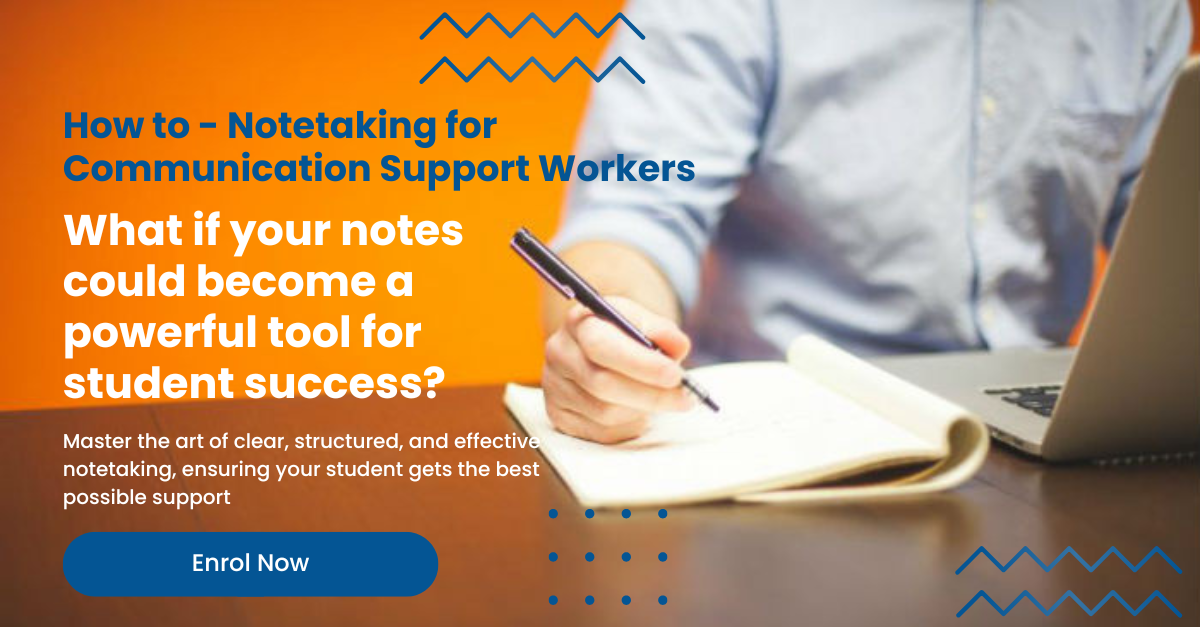The most common mistake CSWs make when notetaking for Deaf students (and what to do instead)

If you're a Communication Support Worker (CSW), you’ve likely experienced this:
You're typing or scribbling away during a lecture or discussion, trying to keep up with what’s being said. You hand over your notes to your Deaf student, hoping they’ll be useful.
But somewhere in the back of your mind, you're wondering:
Did I write too much? Not enough? Was it even clear? Did it help at all?
You’re not alone — and the good news is, it’s not your fault.
Most CSWs don’t receive formal notetaking training before they’re thrown into real educational settings. Instead, they rely on instinct, trial and error, and their best judgment, all while juggling the demands of live speech, multiple speakers, and the pressure of “getting it right.”
Here’s what happens in reality:
-
You try to write everything down just in case it’s important
-
You focus so much on typing that you lose the thread of the conversation
-
You worry that your notes aren’t useful, but you’re not sure what to change
And without feedback from the student (or time to reflect), it becomes a cycle of self-doubt.
But here’s the truth: More words ≠ better support.
It’s not about capturing everything. It’s about capturing the right things in a way that your student can learn from later.
Your notes may be the only way your student can revise, recap, or clarify what happened in that session. And unlike traditional note-sharing, you’re not taking notes for yourself; you’re taking notes for someone else, with different access needs, learning preferences, and sometimes very limited context.
That’s why CSW notes need to be:
-
Structured — so they can be reviewed quickly
-
Context-aware — adjusting to lectures, discussions, or 1:1s
-
Meaning-focused — highlighting key ideas, not filler
-
Neutral and professional — aligned with ethics and confidentiality
And yes — these are all teachable, learnable skills.
So, what can you do differently?
It starts with having the right framework.
When you understand how to structure your notes, how to adapt your style based on the setting, and how to really listen for meaning (not just words), notetaking becomes less stressful and more impactful.
You’ll feel more confident. Your student will be better supported. And you’ll stop second-guessing every bullet point.
At Deaf Umbrella, we work with CSWs daily, and we’ve seen how transformative good notetaking can be.
That’s why we’ve developed a new, CPD-accredited online course that walks you through:
-
Real note styles and how to apply them in different settings
-
The CLEAR Notes™ Framework, a simple method to structure your notes
-
Interactive tools to help you practise, from flip cards to drag-and-drop games
-
Scenario-based lessons to prepare you for lectures, group discussions, and more
And yes — it’s all self-paced, online, and designed specifically with you, the CSW, in mind.
Whether you’re brand new or have years of experience, this course gives you tools that you can apply immediately. Not just theory, but practical strategies that make a difference from day one.
Supporting Deaf students through notetaking is a unique responsibility and an incredible opportunity to make a real difference in their education.
You don’t need to do it alone. You don’t need to guess anymore. And you don’t need to settle for doubt.
There’s a better way — and we’re here to show it to you.


